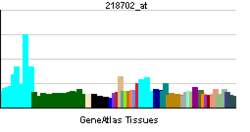SARS2
Seryl-tRNA synthetase, mitochondrial is an enzyme that in humans is encoded by the SARS2 gene.[3][4]
References
- ↑ "Human PubMed Reference:".
- ↑ "Mouse PubMed Reference:".
- ↑ Yokogawa T, Shimada N, Takeuchi N, Benkowski L, Suzuki T, Omori A, Ueda T, Nishikawa K, Spremulli LL, Watanabe K (Aug 2000). "Characterization and tRNA recognition of mammalian mitochondrial seryl-tRNA synthetase". J Biol Chem. 275 (26): 19913–20. doi:10.1074/jbc.M908473199. PMID 10764807.
- ↑ "Entrez Gene: SARS2 seryl-tRNA synthetase 2, mitochondrial".
Further reading
- Ewing RM, Chu P, Elisma F, et al. (2007). "Large-scale mapping of human protein-protein interactions by mass spectrometry.". Mol. Syst. Biol. 3 (1): 89. doi:10.1038/msb4100134. PMC 1847948
 . PMID 17353931.
. PMID 17353931.
- Müller T, Deschauer M, Neudecker S, Zierz S (2007). "Late-onset mitochondrial myopathy with dystrophic changes due to a G7497A mutation in the mitochondrial tRNA(Ser(UCN)) gene.". Acta Neuropathol. 110 (4): 426–30. doi:10.1007/s00401-005-1063-z. PMID 16133542.
- Gerhard DS, Wagner L, Feingold EA, et al. (2004). "The status, quality, and expansion of the NIH full-length cDNA project: the Mammalian Gene Collection (MGC).". Genome Res. 14 (10B): 2121–7. doi:10.1101/gr.2596504. PMC 528928
 . PMID 15489334.
. PMID 15489334.
- Ihalamulla RL, Liyanage CP, Karunaweera ND (2004). "A simple device to maintain in vitro cultures of Leishmania in tropical countries.". Trans. R. Soc. Trop. Med. Hyg. 98 (5): 315–7. doi:10.1016/j.trstmh.2003.10.004. PMID 15109557.
- Gibbons WJ, Yan Q, Li R, et al. (2004). "Genomic organization, expression, and subcellular localization of mouse mitochondrial seryl-tRNA synthetase.". Biochem. Biophys. Res. Commun. 317 (3): 774–8. doi:10.1016/j.bbrc.2004.03.113. PMID 15081407.
- Ota T, Suzuki Y, Nishikawa T, et al. (2004). "Complete sequencing and characterization of 21,243 full-length human cDNAs.". Nat. Genet. 36 (1): 40–5. doi:10.1038/ng1285. PMID 14702039.
- Strausberg RL, Feingold EA, Grouse LH, et al. (2003). "Generation and initial analysis of more than 15,000 full-length human and mouse cDNA sequences.". Proc. Natl. Acad. Sci. U.S.A. 99 (26): 16899–903. doi:10.1073/pnas.242603899. PMC 139241
 . PMID 12477932.
. PMID 12477932.
- Casas C, Ribera J, Esquerda JE (2001). "Antibodies against c-Jun N-terminal peptide cross-react with neo-epitopes emerging after caspase-mediated proteolysis during apoptosis.". J. Neurochem. 77 (3): 904–15. doi:10.1046/j.1471-4159.2001.00314.x. PMID 11331419.

 . PMID 17353931.
. PMID 17353931. . PMID 15489334.
. PMID 15489334. . PMID 12477932.
. PMID 12477932.